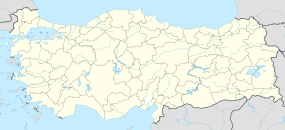Heraclea Pontica
| Ἡράκλεια Ποντική | |

Map indicating Heraclea Pontica (underlined in red) during the Roman expansion in 264 BC
|
|
| Location | Karadeniz Ereğli, Zonguldak Province, Turkey |
|---|---|
| Region | Bithynia |
| Coordinates | 41°17′5″N 31°24′53″E / 41.28472°N 31.41472°ECoordinates: 41°17′5″N 31°24′53″E / 41.28472°N 31.41472°E |
| History | |
| Builder | Colonists from Megara |
| Founded | Between 560–558 BC |
| Periods | Archaic Greece |
Heraclea Pontica (/ˌhɛrəˈkliːə ˈpɒntᵻkə/; Greek: Ἡράκλεια Ποντική Hērakleia Pontikē) was an ancient city on the coast of Bithynia in Asia Minor, at the mouth of the river Lycus. It was founded by the Greek city-state of Megara in approximately 560–558 and was named after Heracles whom the Greeks believed entered the underworld at a cave on the adjoining Archerusian promontory (Cape Baba). The site is now the location of the modern city Karadeniz Ereğli, in the Zonguldak Province of Turkey.
The colonists soon subjugated the native Mariandynians but agreed to terms that none of the latter, now helot-like serfs, be sold into slavery outside their homeland. Prospering from the rich, fertile adjacent lands and the sea-fisheries of its natural harbor, Heraclea soon extended its control along the coast as far east as Cytorus (Gideros, near Cide), eventually establishing Black Sea colonies of its own (Cytorus, Callatis and Chersonesus).
...
Wikipedia

